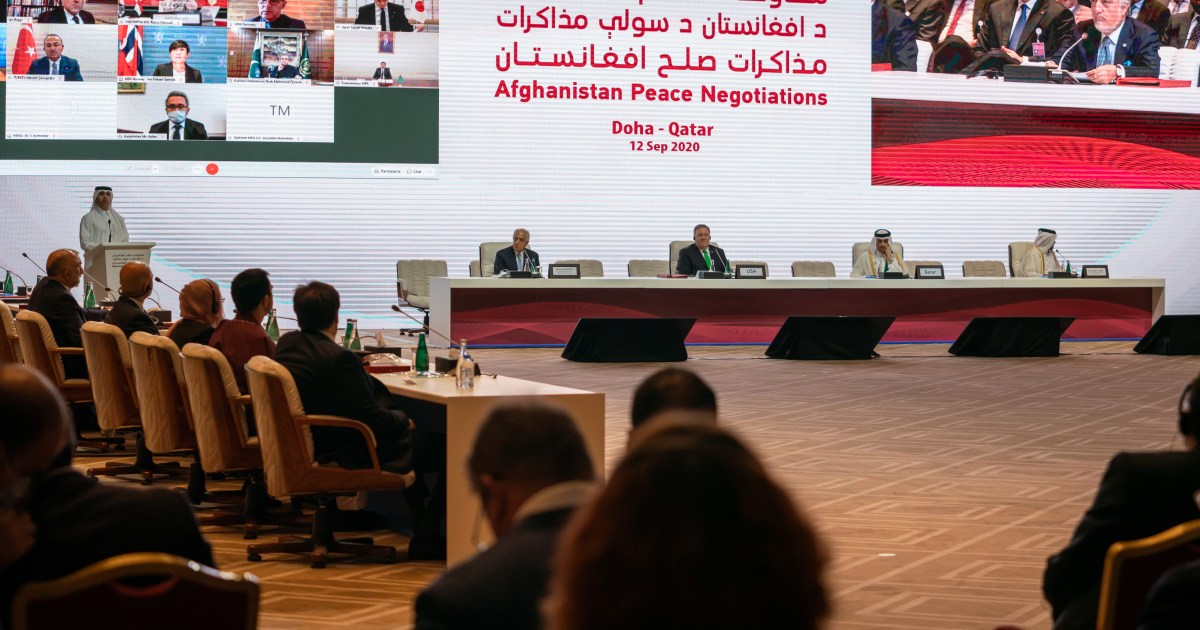Peace negotiations between the Afghan government and the Taliban will continue today, Sunday, in the Qatari capital, Doha, at a time when a Qatari official confirmed that the agreement to negotiate does not mean the end of his country's role in mediation.
Representatives of the Afghan government and the Taliban delegation formed a 10-member joint liaison committee to facilitate the negotiations, which started on Saturday.
The members of the committee will discuss the agenda of direct and closed negotiations, which are scheduled to begin tomorrow, Monday, under the supervision of the Supreme Council for Afghan Reconciliation.
While the government delegation is calling for a humanitarian ceasefire before starting negotiations, the Taliban insists that this be an item of negotiation.
In the context, Mutlaq Al-Qahtani, the Qatari foreign minister's envoy for combating terrorism and mediation in settling disputes, said that the Afghan conflict is an internal affair, and it is the responsibility of the Afghans to solve their problems.
Al-Qahtani added in an interview with Al-Jazeera - broadcast later - that the Afghan agreement to negotiate does not mean the end of the role of mediation and Qatari support.
For its part, the German News Agency quoted Pakistani Foreign Minister Shah Mahmood Qureshi as his call to beware of what he described as the plots of spoilers from inside and outside Afghanistan.
Qureshi said that there is no military solution to the status quo in Afghanistan, and called on the international community to continue supporting the peace process to make it a success.
Earlier today, the Emir of the State of Qatar, Sheikh Tamim bin Hamad Al Thani, received the head of the political bureau of the Taliban, Mullah Abdul Ghani Baradar, and the accompanying delegation at his office at the Amiri Diwan.
Sheikh Tamim expressed his satisfaction at the start of these negotiations, wishing that "it will be crowned with success to achieve the aspirations of the Afghan people for national unity, progress and prosperity."
The Afghan government official in charge of negotiations Abdullah Abdullah called in his opening speech yesterday for "a cease-fire as soon as possible."
On the other hand, Mullah Abdul Ghani Baradar - who is the Taliban's deputy leader for political affairs and one of the founders of the movement - did not adopt a similar stance to the government, noting that sources quoted negotiators acknowledging in the opening session that the talks would be long and complicated.
As for US Secretary of State Mike Pompeo, he said in his speech yesterday, "We will undoubtedly face many challenges in the talks over the coming days, weeks and months. Remember that you are not only working for this generation of Afghans, but for future generations as well."
He added that both sides must find a way "to push the country forward."
US President Donald Trump had pressed for the withdrawal of his country's forces and an end to the longest war fought by the United States, which began nearly 20 years ago, when US forces invaded Afghanistan and overthrew the Taliban regime after the attacks of September 11, 2001.
The UN mission in Afghanistan welcomed the face-to-face peace talks between the Afghan parties in the Qatari capital, and urged all Afghan leaders and negotiators to seize the "historic opportunity" to end the fighting and enter a new era of peace and stability.

